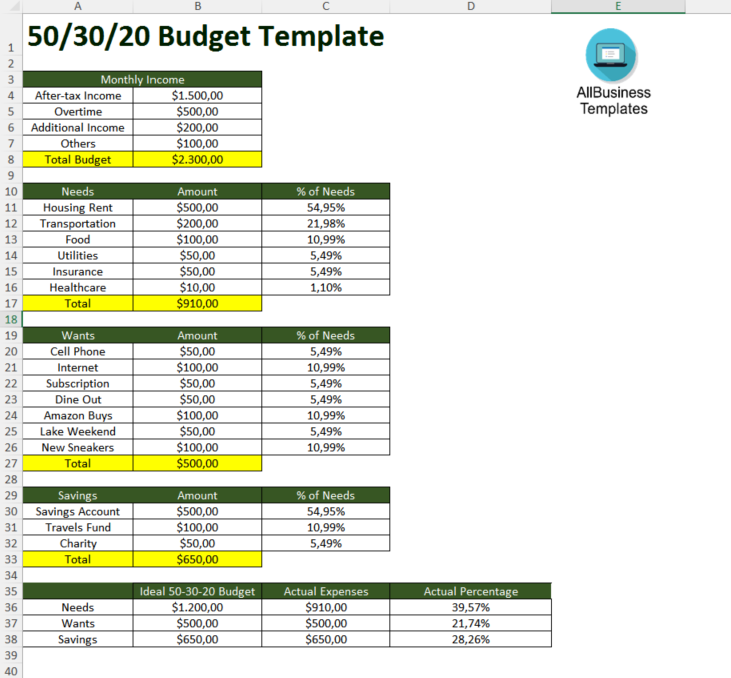50 30 20 budget spreadsheet template
Save, fill-In The Blanks, Print, Done!

Download 50 30 20 budget spreadsheet template
Microsoft Spreadsheet (.xlsx)- This Document Has Been Certified by a Professional
- 100% customizable
- This is a digital download (18.91 kB)
- Language: English
- We recommend downloading this file onto your computer.
How to make a 50 30 20 Budget in Google Sheets or Excel? What is a smart way to create a budget?
Budgets are plans for every dollar you have. In short, it doesn't work like magic, but it represents as much financial freedom as possible and a life free of stress. This article shows you how to create a budget and then manage it.
A very effective way to create a budget for your daily life:
- Monitor your progress by calculating your monthly income and choosing a budgeting method.
- Use the 50/30/20 rule as a simple budgeting guide.
- Make sure to set aside at least 50% of your income for needs.
- Your wants should account for 30% of your income.
- Savings and debt repayment should account for 20% of your income.
- Keep track of your budget and manage it regularly.
Become familiar with the budgeting process
Adding back your automatic deductions for a 401(k), savings, health and life insurance will give you a true picture of your saved and spent funds. If you get a regular paycheck, the amount you receive is likely it, but if you have automatic deductions for a 401(k), savings, and health and life insurance, add them back in as well. Take out any expenses and taxes that reduce your income, such as income from side gigs.
Make sure you have a budget that covers all your needs and wants as well as saving for emergencies and the future. There are two types of budgeting plans: envelopes and zero-based budgets.
Make your savings automatic: Automate as many tasks as possible so you only have to worry about putting the money where it belongs. You can hold yourself accountable for budget blowouts with the help of a friend.
You should manage your budget actively by revisiting it regularly, perhaps once a quarter, as your income, expenses, and priorities change over time.
Plan your budget in a simple way
Our recommendation is to maximize your money by following the 50/30/20 budget. After-tax dollars should be spent on necessities and wants in about 50-50 proportions, with savings and debt repayment at least 20 percent. Our favorite thing about this plan is its simplicity. If someone follows these guidelines over the long term, they are likely to have manageable debt, have enough room to indulge occasionally, and have savings to pay irregular or unexpected expenses and retire comfortably when the time comes.
Spend no more than 50% of your income on needs
In addition to your after-tax income, you should budget for:
1. Groceries.
2. Housing.
3. Basic utilities.
4. Transportation.
5. Insurance.
6. Minimum loan payments. Anything beyond the minimum goes toward savings and debt repayment.
7. Child care or other expenses you need to get to work.
Leaving 30% of your income for wants is a good idea
It can be difficult to distinguish between wants and needs. Generally, though, you must have needs in order to live and work. Entertainment, travel, and dinner out are typical wants.
Spend 20% of your income on debt repayment and savings
Invest 20% of your after-tax income in saving for the future, paying off debt and preparing for the unexpected. Think about your bigger financial picture; you may need to play both the saving and debt repayment game to reach your most pressing financial goals.
Download this 50/30/20 budget spreadsheet template now for your reference and also have a loot at other budget templates here.
DISCLAIMER
Nothing on this site shall be considered legal advice and no attorney-client relationship is established.
Leave a Reply. If you have any questions or remarks, feel free to post them below.
Related templates
Latest templates
Latest topics
- Excel Templates
Where do I find templates for Excel? How do I create a template in Excel? Check these editable and printable Excel Templates and download them directly! - GDPR Compliance Templates
What do you need to become GDPR compliant? Are you looking for useful GDPR document templates to make you compliant? All these compliance documents will be available to download instantly... - Google Docs Templates
How to create documents in Google Docs? We provide Google Docs compatible template and these are the reasons why it's useful to work with Google Docs... - IT Security Standards Kit
What are IT Security Standards? Check out our collection of this newly updated IT Security Kit Standard templates, including policies, controls, processes, checklists, procedures and other documents. - Letter Format
How to format a letter? Here is a brief overview of common letter formats and templates in USA and UK and get inspirited immediately!
cheese

